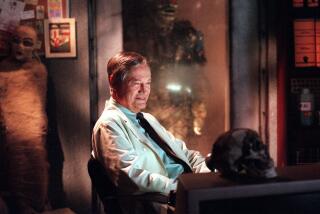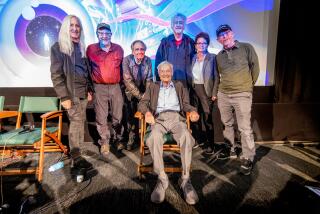Documentary Makers to Honor Leacock
- Share via
Documentary film maker Richard Leacock has been involved with film since he was 13--as a cameraman, editor, writer, producer, director and educator.
“I love finding out how people tick,” he says. This curiosity has led, at 66, to a body of work that includes at least 150 documentaries and a reputation as a technical and stylistic innovator.
Leacock has been singled out for recognition today by the 800-member International Documentary Assn. to receive its career achievement award at the group’s awards luncheon at the Four Seasons Hotel in Los Angeles.
“Richard Leacock is the consummate documentary film maker,” said Mary Bahny Fredrick, executive director of the association. “This is the first year we really honored a hands-on person--although he is more than a film maker. He is really seen as one of the originators of cinema verite .”
Leacock, head of the film and video department at the Massachusetts Institute of Technology, was born in London, but grew up in the Canary Islands, where he made his first film, “Canary Bananas,” at 13. “It’s everything you’d ever want to know about growing bananas,” he said of the 12-minute work.
At 17 he came to the United States. He chronicled World War II as a cameraman for the U.S. Army, filming combat in the Far East. In 1948, Robert Flaherty, “the father of the documentary,” hired Leacock as cameraman and associate producer on the classic “Louisiana Story.”
By the late 1950s, Leacock and colleague Robert Drew had developed the first 16-millimeter portable sync-sound camera and recording equipment. The innovation provided camera crews with a new freedom--and markedly changed the style of documentary making.
Intent on capturing the spontaneity of their subjects, Leacock and Drew worked on several experimental films in the ‘60s. Among the most famous, “Primary” is a vivid account of the 1960 Wisconsin presidential primary between Democrats John F. Kennedy and Hubert H. Humphery.
Finding himself “more or less broke” in 1969, Leacock said he took a job at MIT, though he has continued making films. One of his current projects is a documentary on sign language. On this project, as on others, Leacock is keeping the numbers down. “Two people is plenty; three is a crowd,” he said. “I like shooting and editing my own work.”
Distinguished Documentary Achievement awards winners are “Threat” (Sweden), “Thy Kingdom Come . . . Thy Will Be Done” (United Kingdom), “Chasing a Rainbow: The Life of Josephine Baker” (United Kingdom), “Is It Easy to Be Young” (Soviet Union) and “The Bridge to Freedom,” part of the “Eyes on the Prize” public-TV series (United States).
More to Read
Only good movies
Get the Indie Focus newsletter, Mark Olsen's weekly guide to the world of cinema.
You may occasionally receive promotional content from the Los Angeles Times.










